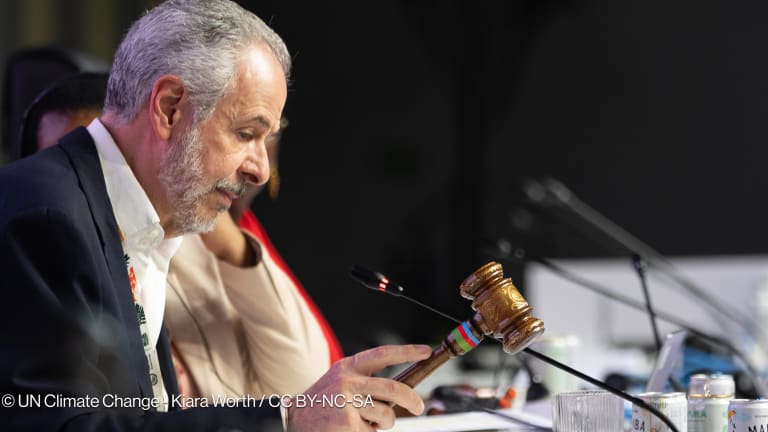Opinion: Today's financial flows determine tomorrow's climate action

The 26th United Nations Climate Change Conference left many disappointed and failed to meet the urgency of the climate crisis. The underlying trend is clear: Finance has a big role to play in stemming the pace of climate change.
The event, held in Glasgow, Scotland, has laid the foundation for a shift away from fossil fuels. In a historic move, its resulting agreement has outlined the need to reduce dependence not only on coal but on all fossil fuels.
During the conference, dozens of financial institutions and countries — including the United States, Canada, France, Germany, and the United Kingdom — committed to end international public finance for fossil fuels. This is a step in the right direction, but the effort fails to hit the mark since big Asian funders — such as China, Japan, and South Korea — are not participating.
The financial sector needs to step up with real and robust climate action that reallocates capital from polluting industries toward a just and resilient transition.
—And what about the financial sector? Is it prepared for a just transition to a low-carbon future?
Amid the climate conference, the Glasgow Financial Alliance for Net Zero — or GFANZ — made a splash by announcing that financial institutions across the world with over $130 trillion in capital had committed to achieving net-zero emissions. The news was significant, but pledges made by alliance members remain vague.
GFANZ institutions continue to channel significant amounts of finance toward new fossil fuel projects. The initiative is not endorsed by some of the biggest climate change enablers, such as U.S. insurance companies, Chinese entities, and Brazilian and Indian banks. “Net-zero” lacks a fixed definition, and the bar to GFANZ membership seems low, raising the question of whether the initiative can succeed in achieving genuine climate action.
A close look at financial institutions in France and the Netherlands — some of which are members of GFANZ and other net-zero initiatives — raises concerns about whether the alliance is another “green washing” exercise.
An assessment of French banks in October revealed that the country’s top four — BNP Paribas, Crédit Agricole, Société Générale, and Groupe BPCE — each have a carbon footprint that is greater than France’s. Not even one of them has publicly committed to making significant reductions.
They continue to support the development of new oil and gas projects. At BNP Paribas, Société Générale, and Groupe BPCE, this accounts for approximately 40% or more of the emissions from their business loan portfolios. All four banks are members of GFANZ’s Net-Zero Banking Alliance, or NZBA.
In the Netherlands, banks, insurers, and pension funds continue to invest more money in fossil fuels than sustainable energy, according to research by the Fair Finance Guide Netherlands. At the end of 2020, 88% of the institutions’ investments in the energy sector — amounting to €34.3 billion — were in coal, oil, and gas. Between 2018 and 2020, 69% of lending and underwriting services were in fossil fuels, representing €9.1 billion. Two of the banks assessed — ING and Rabobank — are also NZBA members.
For GFANZ to make any headway on climate action, it needs a clear road map for phasing out financing of new fossil fuel projects and aligning with the International Energy Agency’s recommendations. Vague commitments — such as 2030 interim targets representing a “fair share” of the 50% decarbonization required by the Race to Zero campaign, with no clarity on what this means — just don’t cut it anymore.
We’re losing time. The impacts of rising sea levels, extreme heat waves, catastrophic floods, storms, wildfires, and droughts will continue to cost investors and society, though the burden will fall heaviest on the most vulnerable.
The financial sector must act now
It isn’t too late for the financial sector to change course, and some are already stepping up to the plate. France’s La Banque Postale and the European Union’s largest pension fund, ABP of the Netherlands, have committed to exit fossil fuels by 2030 and 2023 respectively. Many more must follow.
The financial sector must take steps in the following areas to ensure urgent and just climate action:
Establishing targets. For starters, institutions within the financial sector need to outline short-, medium-, and long-term targets in line with the goal to limit global warming to 1.5 degrees Celsius. In particular, they must halve their financed emissions by 2030. The targets must include ending investments in fossil fuels in a just and timely manner and ensuring that commodities don’t contribute to deforestation or exploitation. The use of so-called offsets to achieve emission reduction targets should be minimized, if not avoided.
Taking action. Robust stewardship and engagement strategies must be a key component of a climate action plan, taking forceful action against climate laggards in investment portfolios. Financial institutions must phase out all fossil fuel investments from their portfolios, starting with excluding investments in countries within the EU or Organisation for Economic Co-operation and Development, fossil fuel projects with high environmental and social risks, and investments in fossil fuel companies that do not have a phaseout plan consistent with the 1.5 C goal.
Reporting. Institutions must ensure full disclosure of all financed emissions and credible verification so that they are on track to achieve ambitions. This must include regularly publishing so-called enhanced disclosures, per the Task Force on Climate-Related Financial Disclosures.
Accountability. Climate accountability will only be possible if financial institutions implement strong governance frameworks at the board level. Tying senior executive remuneration to achievement of the institution’s climate ambitions will be an important indicator of commitment.
Sign up for Devex Invested
The weekly newsletter on how business, social enterprise, and development finance leaders are tackling global challenges.
Support for a just transition. Action on climate change will be incomplete without efforts to ensure that a climate transition is not only immediate but also just. Engagement with workers, communities, and suppliers should be the bedrock of any climate action plan. A transition to a low-carbon economy will not be possible if we do not consider the impacts on those most affected by it.
Now that the hype and hoopla around the U.N. climate conference are behind us, the real work of accelerating a transition toward a sustainable and just world must begin. The time for “virtue signaling” is over.
Climate change is an existential threat to human society and the planet. To reverse course and prevent further destruction, the financial sector needs to step up with real and robust climate action that reallocates capital from polluting industries toward a just and resilient transition. Otherwise, it will have the unenviable label of having financed our species’ extinction.

Search for articles
Most Read
- 1
- 2
- 3
- 4
- 5









